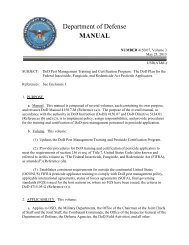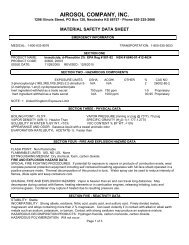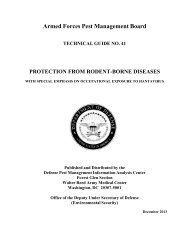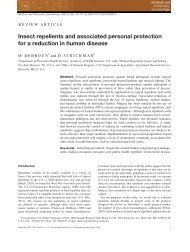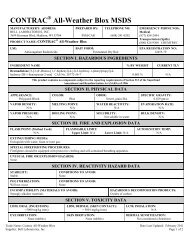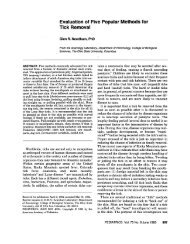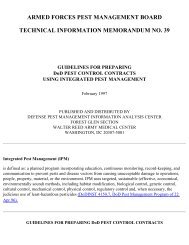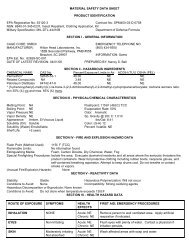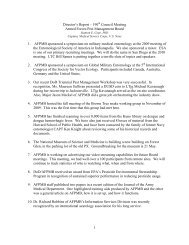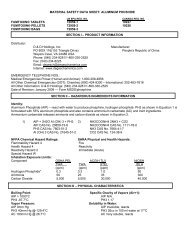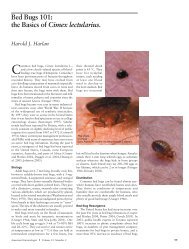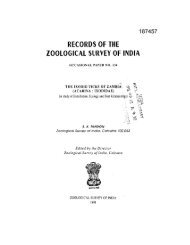Middle East DVEP - Armed Forces Pest Management Board
Middle East DVEP - Armed Forces Pest Management Board
Middle East DVEP - Armed Forces Pest Management Board
You also want an ePaper? Increase the reach of your titles
YUMPU automatically turns print PDFs into web optimized ePapers that Google loves.
construction of deep, durable, rodent burrows. The disease is generally endemicthroughout rural areas of these countries where colonial rodent reservoirs (jirds orgerbils), such as Rhombomys, Psammomys or Meriones, and the proven vector,Phlebotomus papatasi, are present. The burrow systems of these animals provideprotection against extremes of external temperature and desiccation, and containconsiderable amounts of organic debris. Anthroponotic (human-to-human) transmissionof CL due to Le. tropica occurs in urban centers of Iran, Iraq, Syria and Turkey, southernparts of the former Soviet Union, and Afghanistan. CL due to Le. tropica is becomingmore common in rural highland villages in Lebanon, Jordan, Israel and Saudi Arabia.The disease is wide spread in areas with a temperate climate (Mediterranean basin), withan arid, cold climate (Transcaucasian region, Afghanistan, etc.), and with an arid, warmclimate (Jordan, Israel, Saudi Arabia, Egypt, etc.).VL due to Le. infantum occurs in the Mediterranean basin countries of North Africa, the<strong>Middle</strong> <strong>East</strong> and southern Europe, in <strong>East</strong> Africa, South Central Asia, and in China. Inthe <strong>Middle</strong> <strong>East</strong>ern Region, it is reported from parts of Cyprus, Israel, Lebanon, Jordan,Syria, Iraq, Iran, southern Turkey, northern and southern Saudi Arabia, and theneighboring Arab countries of Bahrain, Qatar, United Arab Emrates, Oman and Yemen.(Figure 9). It is not highly endemic in any of these countries. Visceral leishmaniasiscaused by Le. donovani is considered rare in most countries of the region. However, innorthern Iraq it reappeared in the 1970s and spread to central Iraq. In 1973, 1,100 caseswere recorded, with most cases occurring in Baghdad and surrounding areas. Consideredendemic but rare in Kuwait, recent cases of VL are recorded as imported. In southernSaudi Arabia and in neighboring Yemen VL caused by Le. donovani has been reported,and in each case it was considered imported.Transmission Cycles. Le. major is a parasite of colonial desert rodents, especiallygerbils such as the fat sand rat, Psammomys obesus. Female Phlebotomus papatasiinhabit the burrow systems of these rodents and acquire infections while feeding on theirrodent hosts. Amastigotes (the mammalian form of the Leishmania parasite) ingestedwith the bloodmeal transform to a flagellated promastigote form within the gut of thefemale fly. In addition to a bloodmeal, the female fly seeks and consumes sugar from theplants in the area during subsequent nocturnal flights. These sugars help maintainLeishmania infections in the flies. Promastigotes multiply in the gut of the sand flywithin the bloodmeal and undergo development to an infective form called the metacyclicpromastigote. By the time the bloodmeal is digested and the fly is ready to lay its eggs,infective metacyclic promastigotes are ready to be transmitted to the next vertebrate hostwhen the sand fly feeds again. In Le. major foci, where the principal reservoirs arecolonial rodents, humans are considered accidental or incidental hosts, becoming infectedwhen their habitat overlaps that of the rodent host. In urban Le. tropica, humans mayserve as reservoirs. In rural areas, non-human hosts of Le. tropica may include wild anddomestic rodents living in close proximity to humans.Female sand flies are quiet "stealth biters" and may go unnoticed by military personnel asthey fly and bite from dusk to dawn. They may also bite during the daytime if disturbedin their hidden resting sites. Infective-stage promastigotes (metacyclics) are deposited inthe skin of a susceptible host when the infected sand fly refeeds. There they are engulfed110




